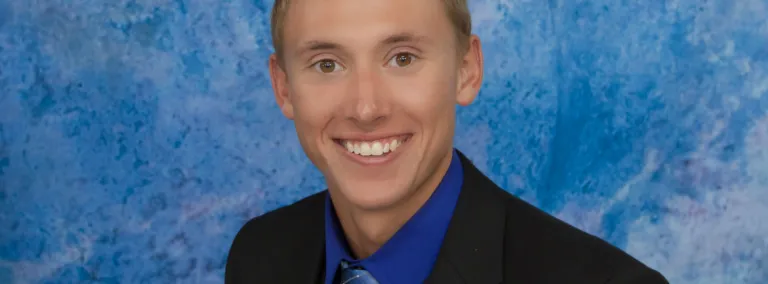Positive connections with SURF inspired student to ask questions
With his science fair project deadline looming, Derick Peters phoned up America’s underground science laboratory
Derick Peters was working on his first science fair project—how to filter water with everyday items you might find in your house—when he first heard about the Sanford Underground Research Facility (SURF). At the time, Peters, who hails from Hartford, South Dakota, was attending West Central Middle School.
He and his lab partner reached out to the SURF Education and Outreach team for some information and came away with science articles, project materials, and lots of encouragement.
The experience was so positive, he reached out again the following year to discuss the topic of his second science fair project—ultraviolet light and the radiation exposure levels it carries throughout the day (heady stuff for a seventh grader).
“I honestly had such a great experience working with the lab and with everyone there. They were so cooperative and helpful and really encouraged us,” Peters said. “Their overall ability to kind of make things make sense, especially on the middle school level, was definitely an impactful part of my life.”
Now a senior biomedical engineering student at the University of Wisconsin-Madison, Peters said his connections to SURF were positive and inspired him to think critically. Peters is part of the Murphy Group at UW-Madison, where he is working with other students and professors to develop the techniques and mechanisms to effectively deliver treatments to repair bone damage.
At SURF, scientists are studying dark matter and neutrinos. Peters work is far less esoteric and appears to have little connection to the work being done nearly a mile underground—not so, said Peters.
“It’s all connected,” said Peters, recalling his experience with SURF as a young student. “The experience was so impactful because the people we talked to understood. They didn’t try to push us one way or another or try to make us learn anything. They were just there to help.”
That’s important for students of all ages, Peters added. “We need to encourage students to be—not just critical thinkers—but independent thinkers,” he said. “We need to encourage them to look at the world and to think about what they want to learn; not just want they want to be. That mindset will drive their curiosity and lead to more questions.”
As a middle school student, Peters knew he wanted to be a doctor. Then, when he was in the eighth grade, his grandfather was diagnosed with untreatable cancer. His grandfather’s illness caused Peters to rethink his path.
“He was a big part of my life. He was an inspiration and a model for me in every way, shape, and form. I loved being around him and it was really sad when he was gone,” Peters said. “You know, we have these wonderful doctors who specialize in different fields. They are able to diagnose and treat things like cancer with different therapies. And I still want to be a doctor. But you’re always asking, ‘Is there a better way? Are there other solutions that can be put into place?’”
Peters said his grandfather was “a big advocate of learning” and encouraged him to ask questions, something he intends to keep doing as he moves toward an MD/PhD in biomedical engineering.
“It’s like I said, it’s not necessarily about what you end up becoming, it’s what you study, it’s what you learn along the way.”
